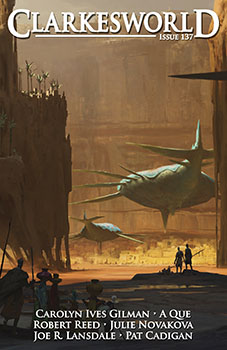 Clarkesworld #137, February 2018
Clarkesworld #137, February 2018
“Deep Down in The Cloud” by Julie Novakova
Reviewed by Filip Wiltgren
In Julie Novakova‘s “Deep Down in the Cloud,” a diver takes on a technocratic big brother. The story takes place largely underwater, and the imagery is quite different, in an almost dreaming way, from a lot of current SF.
I liked the scene and setting, but unfortunately the conflict didn’t quite reach me, and I found myself wanting to skim at several points. However, I can see the skill with which story is written. It is a well-told story in a unique setting, but a story for a different audience than me. If you like to be immersed in a wonderful setting, and don’t mind a somewhat simple plot, then you’ll love “Deep Down in the Cloud.”
What if you’d lost your memory? And what if it happened in a world where everyone had perfect recall? Robert Reed’s “Obliteration” is about the power of technology, the idea of being perfect, and what happens when both fail.
“Obliteration” is an interesting, fluid, at times gripping story. At the same time, it is a thoroughly cerebral tale, which I personally enjoy. But if you like stories where the characters and setting are supreme, this one might not be for you.
“Umbernight”, by Carolyn Ives Gilman, has got it all. A wild and dangerous planet, a struggling community of survivors, a group of explorers trying to retrieve much needed supplies. It’s even got a dog. “Umbernight” is the kind of story where Things Go Wrong, and, boy, do they go wrong. I won’t spoil your pleasure by even hinting at the plot; suffice to say that the ever escalating dangers are as surprising as they are logical and inevitable, and the story is well worth reading simply for the big twist.
Add to that that “Umbernight” has a finely executed setting and an amazingly distinct ensemble cast, something hard to achieve in a story that barely crests novella length, and you’ve got yourself a winner. “Umbernight” has got something for everybody, whether you’re moved by a thrilling plot, amazing setting, or great characters. I loved “Umbernight,” and I would be surprised if it wasn’t on this year’s award lists.
“The Power is Out,” by A Que, translated by Elizabeth Hanlon, is a Chinese post-apocalyptic parable, centered on a small, diverse group of survivors who try to leave a city before the winter comes and they all die. The translation is excellent, with all the cultural divergence preserved in a text that reads very smoothly.
Unfortunately, I feel that “The Power is Out” relies on a number of cultural subtexts that I just don’t understand. Reading it feels like looking at a painting by one of the old masters, while not being able to understand what it depicts.
Still, “The Power is Out” is not your typical post-apocalyptic story. It feels very fresh, so if you’re in the mood for an invigorating story that doesn’t follow the mold of typical Western SF, give it a try.